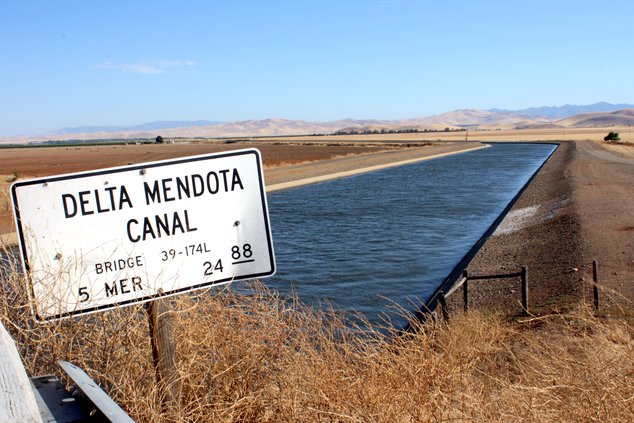What you flush and send down the drain once it is treated by the city is a valuable commodity for farmers on the west side of the San Joaquin Valley.
Just how much Manteca’s treated wastewater is worth to agricultural users served by the Delta Mendota Canal that are often at the mercy of fish flows diversions and drought that reduces their Central Valley Project allocations may be determined in the coming year.
The Manteca City Council last week authorized a year extension for the Private Public Infrastructure Group (PPIG) to finish work on a proposal that would secure buyers for the city’s treated wastewater and secure private investment funds to build a pipeline from the city treatment plant to the Delta Mendota Canal south of Tracy where it would be emptied into and transported to an end user.
The 117-mile canal runs from Tracy to the Mendota Pool on the San Joaquin River near Mendota.
City Manager Tim Ogden noted that the fact California had a wet year apparently reduced the urgency of end buyers reaching a price point that would make the project feasible.
State law allows municipalities to sell their treated wastewater instead of simply returning it to the river.
The market for water in California is volatile, to say the least. Drought, location, and supply all play roles in pricing especially on the spot market where prices in recent years have ranged from $100 to over $1,100 an acre foot.
Many contactors — especially agricultural customers — are willing to enter into long-term agreements for water at costs above the market when a deal is inked to assure deliveries. That is especially true for crops that take a long time to get established such as grape vineyards and almond orchards.
Given Manteca processes an average of 6.5 million acre feet of wastewater daily, in a given year they would generate 7,280 acre feet of water. That is enough to meet the needs of 21,141 acres of California’s most profitable crop — almonds. The majority of the state’s almond growers do not have as secure water as those within the South San Joaquin Irrigation District. Being able to enter into a long-term water deal would be highly desirable for such growers. Altogether California has more than 1.3 million acres planted in almonds.
In the last drought a number of farmers had to let orchards die off and land go fallow due to the lack of water.
If the price of recycled water sold by Manteca was $450 an acre foot that would reflect a gross source of revenue of $3.15 million a year based on the current amount of wastewater the city treats.
It is money that — after costs of executing the deal and delivering the water — would go toward keeping the cost of municipal wastewater treatment down in terms of what is passed on to ratepayers.
PPIG so far has:
confirmed the scope, viability, and economic feasibility of the endeavor.
discussed the project with all relevant federal, state, and local agencies to determine the project is feasible from a regulatory standpoint.
mapped out a complete entitlement schedule complete with budget.
conducted substantial conversations with potential recycled water buyers and has made substantial progress in negotiating a price-point that makes the project financially feasible.
mapped out three pipeline right-of-way alternatives to the Delta Mendota Canal.
discussed with the federal Bureau of Reclamation and determined that the placement of water into the Delta Mendota Canal is legal and financially feasible.
conversed with private investors and has made significant headway ion raising funds for the project.
conducted an extensive financial analysis for the ongoing maintenance and operation and has undertaken a significant analysis of solar power options to offset the project’s energy costs.
The recycled sale option would be less expensive to put in place than a purple pipe system to deliver treated wastewater to parks and other areas of extensive landscaping in Manteca. That is because the deal — if it advances — will not cost Manteca anything to implement as the funding would be with private investment.
In the past when the city has talked about exploring the selling of treated wastewater some have questioned the wisdom of such a move as it would deny the city a source of water during periods of extended drought when supplanting more expensive treated drinking water with recycled wastewater may be in the city’s best interest. The city has indicated around half of all water used in Manteca is for outside purposes with most going to irrigate lawns.
Other cities in the region have made deals to sell treated wastewater that often times involves the end user simply paying for the treated wastewater sent into the river and pumping it out at a point downstream. Some cities have piped treated wastewater to users.
Lodi in 2009 inked a deal with the Northern California Power Authority to buy recycled wastewater for a natural gas power plant that represents $1 million annually for that city.
If a project is determined to be financially feasible, the council action would allow PPIG an exclusive right to negotiate a purchase and sales agreement of the City’s wastewater. To accomplish that, PPIG would come back to the City with a proposal and council would then have the option to proceed forward with completion of the proposed project.
The firm would arrange private financing for the project, pay the city for all associated costs including staff time, negotiate a split of revenues with the city for a defined period which includes paying project financing costs, and dedicated privately constructed facilities to the city.
To contact Dennis Wyatt, email dwyatt@mantecabulletin.com






